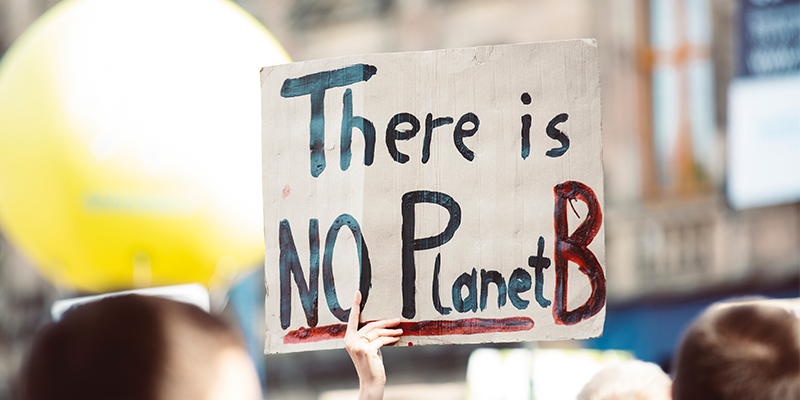#OnlyTogether Can We Protect the Environment

#OnlyTogether Can We Protect the Environment
It has been said that we are travelling through the universe on planet Earth as if it were a spaceship carrying all living things on a journey through the cosmos. This analogy could not be truer in the current context of what we like to call ”The New Normal”. Everyone on Earth has been or will be touched in some way by COVID-19. However, our intense focus on the pandemic seems to have blurred our need for a long-term vision of how we are going to renegotiate our relationship with nature and ensure that our “spaceship” will be able to serve us for centuries – if not millennia – to come.
According to the World Economic Forum Global Risk Report 2020, the top five global risks in terms of the likelihood of their becoming a reality are all environmental. These include extreme weather events, the failure of climate action, human-made environmental damage and disasters, biodiversity loss and ecosystem collapse, and major natural disasters. Delving even deeper into this topic is the recently published Ecological Threat Register 2020, which tells us that “141 countries are exposed to at least one ecological threat between now and 2050. The 19 countries with the highest number of threats have a population of 2.1 billion people”. The already conflict-ridden countries such as Syria, Afghanistan, Iraq, Yemen and the Central African Republic are also ecological hotspots, which makes peacemaking and peacebuilding in them a challenging task.
In recent decades it has become increasingly clear that addressing environmental challenges is not only an environmental imperative, but a peace and security one as well. Mainstreaming caring for the environment at all levels of governance could be a winning strategy to prevent environmental disaster, in light of the fact that both state and human security are at stake should such disasters occur.
Here are some thoughts on what we can do now:
- Widen the environmental and security agenda. Much focus is currently put on climate change in both national and international forums. However, if we do not address biodiversity loss and our general mismanagement of natural resources as being intrinsic to a wider, all-encompassing security agenda, we may fail to connect the dots and miss out on holistic solutions to deal with the interrelated challenges that we face.
- Focus on existing solutions and scale them up. There is a great deal of wisdom in local, indigenous communities who are still connected to nature and the land. Empowering these individuals and utilising their knowledge are key. They can offer techniques and ideas that, when scaled up, could provide solutions to our environmental challenges on a global level.
- Keep the environment at the top of our priority list. With the COVID-19 crisis there may be a tendency to sacrifice long-term solutions for immediate crisis management approaches. We must successfully deal with COVID-19, but moving away from boldly addressing environmental challenges (including in financial terms) may leave us vulnerable to future pandemics and other disasters.
As we have seen with the initial reaction to the current health crisis, some states chose to focus less on compassion and more on competition. Yet, competition among states and communities is not a sensible long-term strategy when everything is interconnected. A “victory” in one area may have ripple effects that end up hurting the supposed “winner” in another area.
Unless we start to deal with environmental challenges in a decisive and innovative way, we will have to face a much more dire situation in the not too distant future. And because environmental challenges know no boundaries, only together can we protect the environment and create a positive, sustainable future. This must be done on all levels, in all geographical areas, both individually and collectively.
ABOUT THIS BLOG SERIES:
As the world attempts to navigate yet another major disruption, we continue to look to one another to identify sustainable solutions and rebuild better. It is time for our world to take conscious steps towards unity and to work together so as to move beyond our preconceptions and challenge our stagnation. This #OnlyTogether blog series provides you with expert insights and the beginnings of a roadmap to a more peaceful and secure future. This blog series was launched to celebrate our 25th Anniversary, discover our 3-day event programme here.
Disclaimer: The views, information and opinions expressed in the written publications are the authors’ own and do not necessarily reflect those shared by the Geneva Centre for Security Policy or its employees. The GCSP is not responsible for and may not always verify the accuracy of the information contained in the written publications submitted by a writer.
Anna Brach is Head of Human Security at the GCSP. Her work focuses on issues of the evolution of security concept, environmental and health security with special emphasis on the climate change and security nexus. Her research interests include human security, human rights, environmental security, climate change, global public commons and resource management. She is responsible for developing and running the GCSP activities on the subject of human security, including executive courses, workshops, and high-level conferences in Geneva and internationally. She is also the Director of the GCSP advanced course on New Issues in Security.


